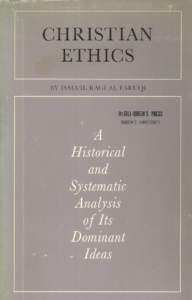 [A new statute with horns and tentacles erected in honor of Ruth Bader Ginsburg on top of NYC Court house]
[A new statute with horns and tentacles erected in honor of Ruth Bader Ginsburg on top of NYC Court house]
What are the causes of the ascendancy of irrational cancel-culture spirit in the colleges, the imposition of sexual policies which undermine the traditional family in wider society, the breakdown of social norms leading to eruption of violent street crime, and the ferocious hostility directed against Judeo-Christian values by the American elite and Woke activists in the USA today? I have for years tried to impress friends who asked me this question that there is no rhyme or reason to the tragic disintegration of what was once a great civilization – these are the symptoms of a “spiritual disease.”
At one level, my answer identifies the root problem. I am aware of the prescient warning given by the American Puritan, John Winthrop who charged his compatriots in 1630 to fulfill the responsibility being raised by God as “a city set on a hill” – “For we must consider that we shall be as a city upon a hill. The eyes of all people are upon us. So that if we shall deal falsely with our God in this work we have undertaken, and so cause Him to withdraw His present help from us, we shall be made a story and a by-word through the world…But if our hearts shall turn away, so that we will not obey, but shall be seduced, and worship other Gods, our pleasure and profits, and serve them; it is propounded unto us this day, we shall surely perish out of the good land whither we pass over this vast sea to possess it.” In other words, their failure to uphold their covenant with God will lead to them becoming a public spectacle for all the world to see.
However, as an observer living outside the USA, I found difficulties spelling out in a concrete manner what comprises the “spiritual disease” that is afflicting the American society. Hence, my answer remains unpersuasive because of its vagueness and lack of specificity. I was therefore pleasantly surprised when I came across an article by Naomi Wolf, “Have the Ancient Gods Returned” which offers a coherent and in-depth analysis of the cultural implosion and the social disintegration that is unravelling right before our eyes. Mind you, Wolf is a public intellectual with whom I least expect to agree with as she is one of the icons of feminism, and a left-wing activist working with the highest political leaders of the country. I have naturally assumed that she would be sympathetic to the anti-Judeo-Christian sentiments that are pervasive among the American elites. However, it seems that she had an epiphany of the dark forces that are energizing the activists who seek to destroy the Judeo-Christian foundations which made the West a great civilization. Her article is well worth reading.
Given below are some excerpts from the article.
——————–
In an essay last year, and in my book The Bodies of Others, I raised a question about existential, metaphysical darkness.
I concluded that I had looked at the events of the past three years using all of my classical education, my critical thinking skills, my knowledge of Western and global history and politics; and that, using these tools, I could not explain the years 2020-present.
Indeed I could not explain them in ordinary material, political or historical terms at all. This is not how human history ordinarily operates.
I could not explain the way the Western world simply switched, from being based at least overtly on values of human rights and decency, to values of death, exclusion and hatred, overnight, en masse — without resorting to reference to some metaphysical evil that goes above and beyond fallible, blundering human agency… Continue reading “Naomi Wolf on the Return of Ancient Demonic Gods in the West”



 The debate on free will has traditionally focused on how external constraints may prevent us from freely doing what we want to do. In contrast, modern psychology highlights how internal constraints (or drives) such as addictions, phobias and other kinds of compulsive behavior can be even more compelling in determining our actions. Frankfurt introduces several distinctions to our internal constraints or desires in order to shed light on they affect the way we exercise our free will.
The debate on free will has traditionally focused on how external constraints may prevent us from freely doing what we want to do. In contrast, modern psychology highlights how internal constraints (or drives) such as addictions, phobias and other kinds of compulsive behavior can be even more compelling in determining our actions. Frankfurt introduces several distinctions to our internal constraints or desires in order to shed light on they affect the way we exercise our free will.
 The current revival at Asbury University, Kentucky, has caught the interest of Christians worldwide. However, some of my friends who have disappointing experiences in “revival meetings” organized by visiting “global prophets” have asked me how we know if a revival is genuinely a work of God.
The current revival at Asbury University, Kentucky, has caught the interest of Christians worldwide. However, some of my friends who have disappointing experiences in “revival meetings” organized by visiting “global prophets” have asked me how we know if a revival is genuinely a work of God.
